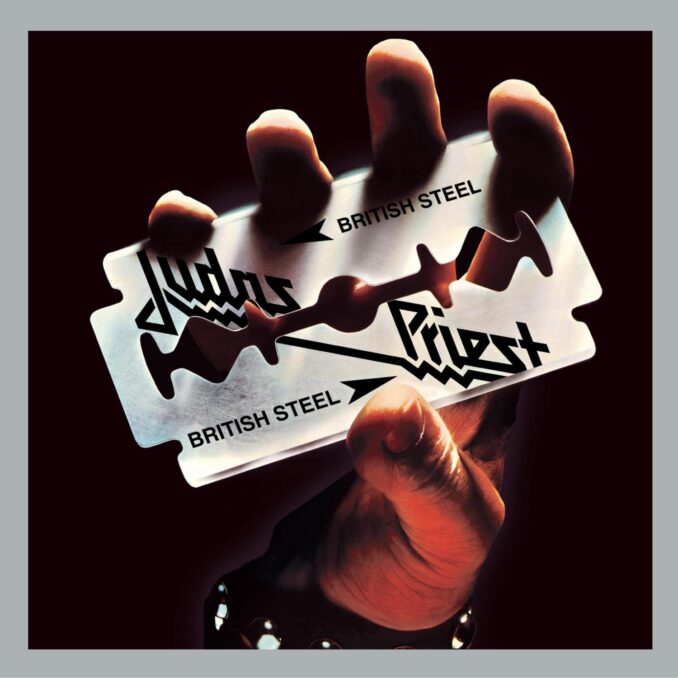
-
JUDAS PRIEST - British Steel - 9/109/10
Summary
Columbia Records
Release date: April 14, 1980
Guitars & Bass: B+
Percussion: C+
Vocals: A-
Lyrics: B
Recording Quality: A
Originality: A
Overall Rating: A-
User Review
( votes)Judas Priest (JP) had won various critic accolades throughout the 1970s as a quality Heavy Rock band with impressive guitar, vocal, and lyrical styles. Unfortunately, during the 70s, reprogrammed electronic “Disco” and antiestablishment “Hippie” music dominated the music scene and airwaves, giving bands such as JP with a unique Heavy Rock foundation little exposure and opportunity to fully reap the fruits of their talents. By the time of the release of their live album, Unleashed In The East, JP had indeed built a modest level of fan base support in some markets throughout the world, however, nothing near the level that was likely deserved as they entered 1980.
As the music industry and fan appetites began to soften their stance towards a heavier rock sound, JP clearly identified the opportunity and made the most of their chance with the creation and release of British Steel. Never has an album cover been more simple, yet better exemplified what was contained within the original grooves of this vinyl masterpiece. The razor blade held in hand with the JP and album title insignias made a brash statement about the music being dangerously sharp, yet controlled, and “metallic” – later giving rise to the conventional use of the term “Heavy Metal” as a well-conceived encapsulation of this newly crafted genre of Heavy Rock music.
With the kick-off track, “Breaking The Law,” JP clearly defines the direction of the album and generally sticks to it. More specifically, the direction being a continued metamorphosis from the highly complex and dark musical and lyrical patterns and vocals of earlier releases to something much more direct, simple, and forceful. The most recent prior studio release, Hell Bent For Leather, began this change, but British Steel landed JP at their new home. The first most evident deviation from prior efforts was the addition of Dave Holland on drums, whose style and talents are geared towards a methodical and bare bones approach to percussion. Around this change came simplified guitar patterns with well-placed and deliberate solos that refused to neither get ahead of nor away from the persuasive, yet controlled, percussion patterns that dictate the pace of each song. Rob Halford’s lyrics consciously “lightened up” too to steer away from the complex topics and scenarios so well-painted in the past, opting instead to write lyrics that were impressively catchy, easy to decipher, and readily recallable by the average music fan hungry for a style more genuine and aggressive than the Bee Gees. Granted, the 2nd track, “Rapid Fire,” shows more signs of a return to the Stained Class era than a progression towards what was to come from the band for the rest of the 80s, but even this fast-paced, complex lyrical song merges with JP’s efforts throughout the album to purify their sound. In the end, “Rapid Fire” leaves the listener ready for a much-needed nap as it successfully extracts every bit of stored energy out of the listener’s adrenaline glands. Ensuing tracks, “Metal Gods,” “Grinder,” “United,” and the perennial JP tour anthem “Living After Midnight” quickly throw away any potential confusion and links to past efforts, and get back to the “Breaking The Law” musical and lyrical style that made this album a true defining moment in the history of Heavy Metal.
However, the album is not without blemish. The track “You Don’t Have To Be Old To Be Wise” is somewhat irrelevant to the rest of the album and drawn out without a clear decision on what is to be accomplished by the song in the first place. Additionally, “The Rage” doesn’t quite live up to the high quality standards of all the other songs (although its beginning does throw in an unexpected change-up). These songs are by no stretch of the imagination complete failures, but they do give the listener the tendency to want to skip forward to the last masterful track on the album, “Steeler,” and are the sole reason for this album not receiving an overall grade of A+/10.0.
In sum, this album is a “must have” for all true and emerging Heavy Metal fans. In many ways, owning this album (along with a few others of its time) is as necessary to a Metal enthusiast’s understanding of the history of the genre as owning a Bible would be to a born again Christian. JP hit the nail squarely with this effort, and other bands followed their lead. Halford’s voice was strong throughout each song, the guitar work was both tasteful and original, and the album clearly demonstrated its timelessness and worthiness of spinning at any juncture.

![HELLOWEEN - Keeper Of The Seven Keys Part I [Expanded Edition]](https://www.metalexpressradio.com/wp-content/uploads/2015/09/HELLOWEEN-Keeper-Of-The-Seven-Keys-Part-I-Expanded-Edition-326x326.jpg)
![HOLY MOSES - World Chaos [Reissue]](https://www.metalexpressradio.com/wp-content/uploads/2015/09/HOLY-MOSES-World-Chaos-Reissue-326x326.jpg)

Be the first to comment